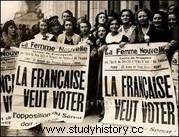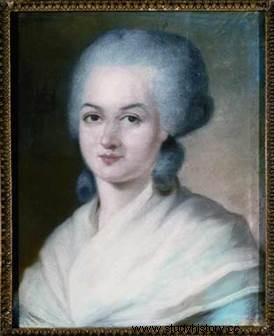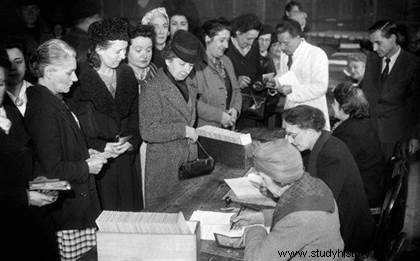 As early as 1944, Free France and De Gaulle reflected on the social and societal reforms that would have to be put in place. once peace has returned:women's right to vote in france is a highly symbolic and long overdue measure. For nearly a century, French women have been excluded from universal suffrage, and France will be one of the last European countries to remedy this anomaly. It was in the municipal elections of April 29, 1945 that women voted for the first time.
As early as 1944, Free France and De Gaulle reflected on the social and societal reforms that would have to be put in place. once peace has returned:women's right to vote in france is a highly symbolic and long overdue measure. For nearly a century, French women have been excluded from universal suffrage, and France will be one of the last European countries to remedy this anomaly. It was in the municipal elections of April 29, 1945 that women voted for the first time.
From Revolution to Suffragettes
Paradoxically, it was the French Revolution that brutally curbed women's aspirations to participate in political life. In 1789, Abbé Sieyès distinguished between "active" citizens and "passive" citizens, and classed women in the second category in the same way as children, foreigners or anyone who could not pay a tax. electoral. Despite Condorcet's appeal, they were officially excluded from the right to vote by the National Assembly on December 22, 1789, an exclusion maintained by the Constitution of 1791, then by a vote of the National Convention on July 24, 1793. And this a few months before the execution of Olympe de Gouges, author of the Declaration of the Rights of Woman and Citizen.
 Throughout the 19th century women struggled against this illogicality of their marginalization in politics . Tribunes in the newspapers, creation of clubs, public interventions, petitions, demonstrations, attempts to register on the electoral lists give an audience to this fight. Even if they do not follow, or hardly follow, the direct actions and radical methods of the "suffragettes" across the Channel, the demands for the right to vote of French women remain no less firm.
Throughout the 19th century women struggled against this illogicality of their marginalization in politics . Tribunes in the newspapers, creation of clubs, public interventions, petitions, demonstrations, attempts to register on the electoral lists give an audience to this fight. Even if they do not follow, or hardly follow, the direct actions and radical methods of the "suffragettes" across the Channel, the demands for the right to vote of French women remain no less firm.
Women's Suffrage:Strong Resistance
In the first half of the 20th century, bills to grant women the right to vote were passed by the Chamber of Deputies, before the Senate rejected them, either by postponing the text indefinitely, or by opposing it by voting. The Senate is the main institutional obstacle to the adoption of the measure. The Radicals, around whom the entire parliamentary majority is organized, do not want to hear of a reform threatening the political balance. They suspect the women of being influenced by the clergy. They are perceived as "under influence", their political maturity seems doubtful as their republican devotion.
The pope's strong support for women's suffrage from 1919 further reinforced in the minds of radicals the idea that the Church was attempting through women to regain influence in society. The France of the Third Republic therefore never took the plunge, even if it encouraged progress in the education of girls and if the Popular Front government of Léon Blum entrusted three secretaries of state to women in 1936. The deputies remained reluctant and senators even more scrupulous about protecting the "Republican" temple from the threat of the "cap."
Women's voices
Combat finds its full legitimacy during the Second World War, a period during which women had to work, participate in the war effort, sometimes engaged in the Resistance, while continuing to take care of their home and family, while the men had gone to the front. The new political power, younger, resulting from the Resistance, recognizes in women the full responsibility of citizens by following the evolution of the great democratic countries. And it is quite naturally that the power established in Algiers decides to grant women the right to vote by an ordinance of April 21, 1944. They become voters and eligible under the same conditions as men.
 The double referendum of October 1945 concerning the acceptance of a new regime and the limitation of the powers of the Constituent Assembly, at the same time as on the election to this same Constituent Assembly, saw them go to the polls. There is no doubt that women counted for a large part in the electorate of the Gaullist RPF created in 1947 and in the majorities which would later come together, after its return to power, behind General de Gaulle. In any case, this is what the proponents of anticlerical radicalism feared.
The double referendum of October 1945 concerning the acceptance of a new regime and the limitation of the powers of the Constituent Assembly, at the same time as on the election to this same Constituent Assembly, saw them go to the polls. There is no doubt that women counted for a large part in the electorate of the Gaullist RPF created in 1947 and in the majorities which would later come together, after its return to power, behind General de Gaulle. In any case, this is what the proponents of anticlerical radicalism feared.
The trend has since changed and the female electorate is less and less distinguishable from the male electorate, even if the demographic situation means that older women are much more numerous than men of the same generation, which explains their more conservative vote. Women are now voters, but there is still a long way to go for equality between men and women...
Bibliography on women's suffrage in France
- Anne-Sarah Bouglé-Moalic, The vote of the French women:One hundred years of debates 1848-1944, University Press of Rennes, 2012.
